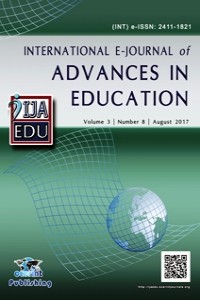Abstract
References
- Füsun Akkök, 2015. Handbook for Career Guidance. Technical Assistance to VET and Employment Reforms in Georgia EUVEGE Ch. Schiermann, B.Ertelt, J. Katsarov, R. Mulvey, H. Reid and P. Weber. 2014. NICE Handbook NICE Handbook for the Academic Training of Career Guidance and Counseling Professionals. HdBA Matching Skills and Labour Market Needs Building Social Partnerships for Better Skills and Better Jobs. 2014. World Economic Forum Global Agenda Council on Employment Career Guidance in Education, Profession and Labour Market Management. 2013. Slovak University of Technology in Bratislava Career Guidance A Handbook For Policy Makers. 2004. Organization for Economic Co-operation and Development (OECD) European Commission (EC) Torino Process 2014 GEORGIA Sectorial Policy Support Program: Employment and Vocational Education and Training
Abstract
The article reviews career guidance
as a support mechanism for professional education and considers it as a
necessary tool to choose the right career. The need of providing advisory
service to young people and adolescents regarding professional guidance,
identifying strengths and weaknesses, realizing one’s interests and
inclinations may arise at various stages of life: after the completion of basic
level, finishing secondary school, starting a professional career, changing a
job, career planning, starting a family, unemployment. In each of these
situations young people and adolescents may need help from professional
consultants.
Within the scope of the article secondary
and tertiary level students and parents from Georgia have been surveyed. The
questionnaires were designed to identify students’ and parents’ attitudes
towards professional orientation classes, how they evaluate the importance of
career guidance at school, which grades they consider most suitable for
professional orientation classes. The survey attempts to find out who gives
advice to Georgian secondary-level students when making career choices from
students’ and parents’ perspectives. Tertiary level students were also surveyed
in an attempt to find out what or who influenced them when choosing careers and
to evaluate their satisfaction with their decisions. It also looks at the level
of parents’ involvement in the implementation of professional guidance at
schools.
Through the analysis and processing
of qualitative questionnaires we summed up the main challenges and problems
that hinder making meaningful career choices. The article draws up some
conclusions and recommendations important for Georgian environment.
References
- Füsun Akkök, 2015. Handbook for Career Guidance. Technical Assistance to VET and Employment Reforms in Georgia EUVEGE Ch. Schiermann, B.Ertelt, J. Katsarov, R. Mulvey, H. Reid and P. Weber. 2014. NICE Handbook NICE Handbook for the Academic Training of Career Guidance and Counseling Professionals. HdBA Matching Skills and Labour Market Needs Building Social Partnerships for Better Skills and Better Jobs. 2014. World Economic Forum Global Agenda Council on Employment Career Guidance in Education, Profession and Labour Market Management. 2013. Slovak University of Technology in Bratislava Career Guidance A Handbook For Policy Makers. 2004. Organization for Economic Co-operation and Development (OECD) European Commission (EC) Torino Process 2014 GEORGIA Sectorial Policy Support Program: Employment and Vocational Education and Training
Details
| Journal Section | Articles |
|---|---|
| Authors | |
| Publication Date | August 31, 2017 |
| Submission Date | August 27, 2017 |
| Published in Issue | Year 2017Volume: 3 Issue: 8 |
Cited By
The effects of school career guidance on career choices of radiography undergraduate students at a University in Gauteng Province, South Africa
Journal of Medical Imaging and Radiation Sciences
https://doi.org/10.1016/j.jmir.2024.04.001
Published and Sponsored by OCERINT International © 2015 - 2025
Contact: ijaedujournal@hotmail.com
International E-Journal of Advances in Education by IJAEDU is licensed under a Creative Commons Attribution-NonCommercial 4.0 International License. Permissions beyond the scope of this license may be available at http://ijaedu.ocerintjournals.org



